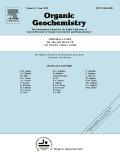
ORGANIC GEOCHEMISTRY
Scope & Guideline
Advancing Insights in Geochemistry and Petrology
Introduction
Aims and Scopes
- Organic Matter Composition and Characterization:
Research articles often delve into the molecular composition of organic matter, employing advanced techniques such as mass spectrometry and gas chromatography to characterize organic compounds in sediments, oils, and other geological matrices. - Biogeochemical Processes and Environmental Interactions:
The journal highlights studies that investigate the biogeochemical processes influencing organic matter transformation, including biodegradation, diagenesis, and the impact of environmental factors on organic geochemistry. - Paleoenvironmental and Paleoclimatic Reconstructions:
A significant area of focus is the use of organic geochemical proxies to reconstruct past environmental conditions, climate changes, and the ecological dynamics of ancient ecosystems. - Source and Maturity Evaluation of Hydrocarbons:
Numerous studies assess the source rock characteristics and thermal maturity of hydrocarbons, providing insights into petroleum formation, migration, and the geochemical signatures of various oil types. - Analytical Method Development:
The journal also emphasizes the development of novel analytical methods for the extraction and characterization of organic compounds, enhancing the precision and accuracy of organic geochemical analyses.
Trending and Emerging
- Advanced Analytical Techniques:
There is a growing trend towards utilizing high-resolution mass spectrometry and other cutting-edge analytical methods to explore organic compounds at unprecedented levels of detail, enhancing our understanding of complex organic mixtures. - Interdisciplinary Approaches to Organic Geochemistry:
Research increasingly incorporates interdisciplinary approaches, combining organic geochemistry with microbiology, ecology, and climate science to address complex environmental challenges and the dynamics of organic matter in various ecosystems. - Impacts of Climate Change on Organic Matter Dynamics:
Emerging studies are focusing on how climate change affects organic matter composition and behavior in different environments, including aquatic and terrestrial ecosystems, reflecting a broader interest in the implications of global change. - Microbial Influence on Organic Matter Transformation:
There is an increasing emphasis on understanding the role of microbial communities in the degradation and transformation of organic compounds, highlighting the significance of biological processes in organic geochemistry. - Paleoenvironmental Applications of Organic Geochemistry:
Research aimed at reconstructing past climates and environments using organic geochemical proxies is gaining traction, with a focus on understanding historical ecological dynamics and their implications for current environmental changes.
Declining or Waning
- Traditional Hydrocarbon Geochemistry:
Studies focusing exclusively on conventional hydrocarbon geochemistry, particularly those that do not integrate modern analytical methods or interdisciplinary approaches, appear to be decreasing. This may be due to the growing emphasis on more complex organic matter analysis and environmental interactions. - Static Biomarker Studies:
Research concentrating solely on static biomarker analyses without considering temporal changes or environmental dynamics is waning. The field is moving towards more dynamic studies that incorporate ecosystem responses and changes over time. - Simplistic Environmental Impact Assessments:
Papers that offer basic environmental impact assessments of organic compounds without comprehensive biogeochemical context are becoming less frequent, as there is a push for more integrated studies that consider multiple environmental factors and their interactions.
Similar Journals
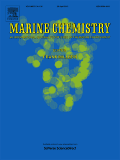
MARINE CHEMISTRY
Bridging Chemistry and Ocean HealthMARINE CHEMISTRY, published by Elsevier, is a premier international journal that has been at the forefront of advancing knowledge in the fields of chemistry, oceanography, and environmental science since its inception in 1972. As indicated by its impressive impact factor and its numerous Q1 rankings in Chemistry, Oceanography, and Water Science and Technology for 2023, the journal is a vital resource for researchers and professionals dedicated to addressing critical issues related to marine environments and their chemical dynamics. The journal publishes high-quality research that explores various aspects of chemical processes in aquatic systems, aiming to bridge the gap between theoretical studies and practical applications. With a significant emphasis on interdisciplinary work, MARINE CHEMISTRY serves as a platform for sharing innovative research findings that contribute to the sustainability and health of marine ecosystems. Although it is not an open-access publication, its comprehensive repository of scholarly articles remains accessible through institutional subscriptions, providing limitless opportunities for growth and discovery in the field.
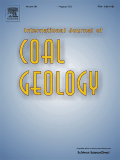
INTERNATIONAL JOURNAL OF COAL GEOLOGY
Advancing coal geology for a sustainable future.INTERNATIONAL JOURNAL OF COAL GEOLOGY, published by Elsevier, stands as a leading platform dedicated to advancing understanding in the fields of coal geology, stratigraphy, and fuel technology. With a robust H-Index reflecting its academic significance and an enviable impact factor, this journal is categorized in the prestigious Q1 quartile across various domains including Economic Geology and Geology in 2023, establishing its reputation within the top echelon of geoscience publications. Spanning from 1980 to 2024, it offers a comprehensive archive of pioneering research, effectively bridging gaps between theoretical frameworks and practical applications in coal exploration and utilization. Researchers, professionals, and students are invited to explore high-quality articles that contribute to understanding coal deposits, their formation, and sustainable energy practices. Its esteemed positioning within Scopus rankings, such as Rank #1 in Stratigraphy, makes it an indispensable resource for anyone looking to deepen their expertise in coal-related geological sciences.

GEOCHEMISTRY INTERNATIONAL
Unveiling the Secrets of Geochemical ProcessesGEOCHEMISTRY INTERNATIONAL, an esteemed journal published by MAIK NAUKA/INTERPERIODICA/SPRINGER, serves as a vital platform for researchers in the fields of geochemistry, petrology, and geophysics. With a deep history reaching back to its inception, the journal spans significant converged years from 1977 to 1978 and continues its publication through 2024. Although it currently does not offer Open Access options, its scholarly impact is underscored by an established reputation indicated by its Q3 categorization in both Geochemistry and Petrology and Geophysics for 2023. Researchers can leverage this platform to disseminate groundbreaking findings and engage with contemporary discussions in Earth and planetary sciences, where it ranks at the 39th and 32nd percentiles within its respective categories. The journal is an essential resource for professionals, students, and scholars seeking to deepen their understanding of geochemical processes and evolve scientific discourse within this dynamic field.

Journal of Sedimentary Environments
Fostering Collaboration in Sedimentary Science.Journal of Sedimentary Environments is a leading open-access publication dedicated to advancing the study of sedimentary processes and environments. Published by SPRINGER HEIDELBERG, this journal embraces a wide array of topics including sedimentology, paleoenvironments, and the interactions between sediments and ecosystems. Since its transition to open access in 2016, it has prioritized making high-quality research widely available, fostering collaboration and innovation among researchers, professionals, and students in the field. With a commitment to excellence, the journal aims to publish groundbreaking studies that enhance our understanding of sedimentary environments, making it an essential resource for anyone interested in the dynamics of Earth’s sedimentary systems. Located in Heidelberg, Germany, this journal is poised to play a vital role in shaping current and future research discussions worldwide.
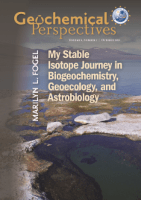
Geochemical Perspectives
Illuminating the Path of Geochemical Discovery.Geochemical Perspectives, published by the European Association of Geochemistry, is a pivotal journal that caters to the dynamic field of geochemistry and its related disciplines. With an ISSN of 2223-7755 and an E-ISSN of 2224-2759, this journal serves as a vital platform for disseminating cutting-edge research and developments from 2012 to the present, and into 2024. Notably, the journal has established itself with impressive rankings, including Q2 in both Geochemistry and Petrology and Geology, and a Q3 standing in Environmental Chemistry for 2023, highlighting its significant contribution to these critical scientific areas. The journal's accessibility, although not open access, ensures that valuable insights and findings are shared within the academic community. Researchers, professionals, and students eager to explore innovative perspectives and applications in geochemistry will find this journal an essential resource in their pursuit of knowledge and advancement in the field.

Boletin de Geologia
Advancing Geological Knowledge, One Article at a Time.Boletin de Geologia is a prominent open-access journal published by UNIV INDUSTRIAL SANTANDER, dedicated to advancing the field of Earth and Planetary Sciences. Since its transition to open access in 2000, this journal has provided a platform for researchers to disseminate their findings and engage with the global scientific community. With an ISSN of 0120-0283 and an E-ISSN of 2145-8553, it is indexed in Scopus and has secured a notable Q3 ranking in the category of miscellaneous Earth and Planetary Sciences as of 2023, reflecting the impact and relevance of its published articles. The journal's geographical scope, rooted in Colombia, allows it to highlight significant geological research pertinent to the region while also contributing to global discussions. Scholars and practitioners interested in innovative research within this field will find Boletin de Geologia an invaluable resource for unlocking knowledge and fostering collaboration in the geological sciences.
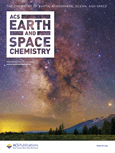
ACS Earth and Space Chemistry
Exploring the Chemical Cosmos of Earth and BeyondACS Earth and Space Chemistry is a leading journal published by the American Chemical Society, dedicated to advancing the interdisciplinary fields of atmospheric science, geochemistry, and planetary science. Since its inception in 2017, this journal has quickly established itself as a pivotal resource for researchers and professionals, boasting an impressive impact factor and securing its position in Q2 of the Scopus rankings for 2023 across its relevant categories. The journal publishes cutting-edge research articles, reviews, and commentaries that explore the chemical processes influencing Earth and space environments. By providing open access to invaluable research from experts around the globe, it encourages collaboration and dissemination of knowledge, crucial for addressing pressing environmental and planetary challenges. Situated in the heart of Washington, D.C., the journal's editorial office works diligently to ensure rigorous peer review and high-quality publications that meet the needs of its diverse audience, including scholars and students keen to stay abreast of developments in these dynamic fields.
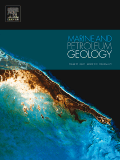
MARINE AND PETROLEUM GEOLOGY
Pioneering Research for Marine and Petroleum AdvancementsMarine and Petroleum Geology, published by Elsevier Science Ltd, is a premier, multidisciplinary journal that addresses critical advancements in the fields of geology, geophysics, oceanography, stratigraphy, and economic geology. With an impressive 2023 impact factor reflecting its influence across these vital domains, this journal maintains a prestigious standing, having achieved a Q1 ranking in multiple categories, including Economic Geology and Geophysics. Since its inception in 1984, it has been a key platform for researchers and practitioners to disseminate innovative findings, foster interdisciplinary dialogue, and enhance our understanding of geological processes affecting marine and petroleum resources. The journal is particularly valuable for those looking to stay abreast of the latest developments in Earth sciences, contributing to both academic knowledge and practical applications. Available through traditional subscription access, it serves as a cornerstone resource for scientists, students, and professionals eager to engage with cutting-edge research.
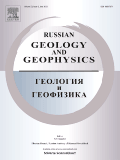
Russian Geology and Geophysics
Unveiling Earth's Secrets, One Study at a TimeRussian Geology and Geophysics is a seminal journal published by GEOSCIENCEWORLD that plays a pivotal role in the dissemination of vital research within the realms of Earth-Surface Processes, Geology, and Geophysics. With an ISSN of 1068-7971 and an E-ISSN of 1878-030X, this journal has witnessed a continuous evolution since its convergence in 2007 and is poised to thrive through 2024. While it is not an Open Access journal, it is recognized for its significant contributions to the academic community, holding a respectable Q2 ranking in Earth-Surface Processes and Q3 rankings in both Geology and Geophysics as of 2023. The journal’s impact factors align it within competitive quartiles, marking it as an essential resource for researchers and professionals seeking to stay at the forefront of geological and geophysical sciences. By publishing high-quality peer-reviewed articles, the journal fosters an environment of knowledge sharing and innovation, making it indispensable for students, practitioners, and scholars alike who are dedicated to advancing our understanding of Earth's complex systems.

Geochemical Perspectives Letters
Connecting researchers through groundbreaking geochemical research.Geochemical Perspectives Letters, published by the European Association of Geochemistry, is a leading open-access journal that has been at the forefront of geochemical research since its inception in 2015. Based in France, this journal is dedicated to disseminating high-quality, original research and reviews across the fields of Environmental Chemistry, Geochemistry, and Petrology, and Geology. With an impressive Q1 ranking in multiple categories, and notable Scopus rankings placing it among the top-tier journals in Earth Sciences, Geochemical Perspectives Letters aims to foster scientific dialogue and collaboration among researchers and professionals. Its open-access model ensures widespread dissemination of knowledge, making it accessible to a diverse audience, including students and seasoned experts alike. As the journal continues to converge research insights from 2015 to 2024, it remains a pivotal resource for those striving to understand and address the complexities of our planet's geochemical processes.